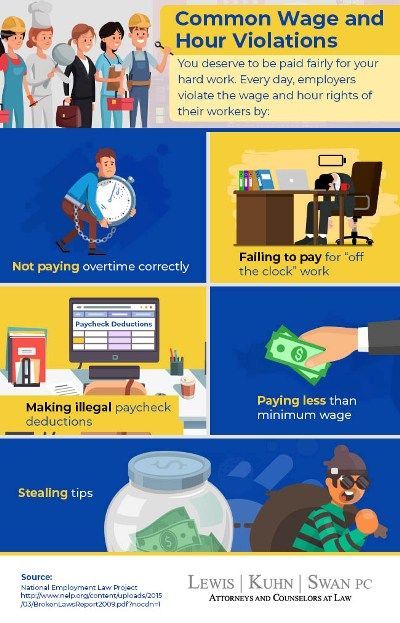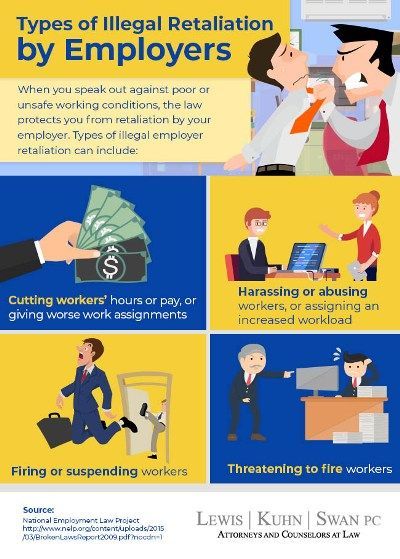Call Now: 719-694-3000
Employment Law
Employment, Insurance, Malpractice, and Estate Attorneys Serving Denver, Colorado Springs, Pueblo, Castle Rock & Nearby Colorado
Employment Attorney In Denver & Colorado Springs
Your job is your livelihood. You deserve to work in an environment where your rights are respected and protected. Unfortunately, far too many hardworking employees are mistreated and taken advantage of in the workplace. Like many of these workers, you may feel afraid to stand up for your rights for fear of risking your job, living situation, and the future of your family.
Case Types
We understand how overwhelming it is to be on the receiving end of mistreatment in the workplace. Our employment lawyers have the skill, knowledge, and experience necessary to stand up for your rights and protect you from retaliation.
If you live in the Denver, Colorado Springs, Pueblo, or Castle Rock, CO areas and need an experienced law firm you can trust with your employment law issues, call Leventhal Swan Taylor Temming PC today at 719-694-3000 to begin building your case.
Read more about representative cases in which our attorneys represent employees:
- Types of employment law cases
- Wage and hour disputes
- Overtime disputes
- Medical leave disputes
- Employment contracts
- Severance packages and executive compensation
- DORA complaints
Types of Employment Law Cases
Employment law encompasses a complex network of laws that govern how employers must treat employees, employment applicants, and former employees. These laws are intended to protect workers from a variety of wrongful workplace practices, including:
- Failure to pay proper wages and overtime: You are entitled to receive the appropriate compensation for hours worked or tasks completed.
- Discrimination: Your employer is not allowed to discriminate against you on the basis of race, religion, national original, color, gender, sex, age, sexual orientation, pregnancy, or veteran status.
- Hostile work environment: It is not illegal for your boss to be a jerk. However, an employer may not sexually harass you or create a hostile work environment based on your protected status, if applicable.
- Wrongful termination: Employment in Colorado is generally “at-will.” However, it’s unlawful for employers to fire you for a number of protected reasons, including complaining about safety issues, fraud, or wages. It is also illegal for an employer to fire you based on your race, religion, national original, color, gender, sex, age, sexual orientation, pregnancy, or veteran status.
- Retaliation: If you have reported an unsafe condition or illegal action in your workplace, your employer may not retaliate against you in any way.
Our experienced team of employment lawyers is intimate with federal and state statutes and case law in a wide range of employment law issues. If you have been wronged in the workplace, call us now to discuss your case.

Wage and Hour Disputes
You work hard and you deserve to be paid for your time. Even if you enjoy a level of job satisfaction, you work to provide for yourself and your loved ones. Your employer’s failure to pay fair wages and overtime can impact not just you, but your entire family.
Discuss your wage & hour dispute with a skilled attorney
Wage and hour disputes can encompass a wide range of situations, including:
- Unpaid overtime
- Vacation pay
- Late paychecks
- Off-the-clock work
- Misclassification as an exempt salaried worker
- Misclassification of employees as independent contractors
- Miscalculations of hourly wages, salaries, commissions, bonuses, and other types of earned payment
- Illegal withholdings
- Unreimbursed expenses
- Late pay and back pay
In Colorado, there are three main bodies of law that govern hours and wages:
- The Colorado Minimum Wage Order (CWO): This state regulation requires employers to pay employees their earned wages at the proper rate. It governs minimum wages, overtime, hours, and other issues. The CWO only applies to employees working in certain industries.
- The Colorado Wage Act (CWA): This state law deals with pay statements, paydays, pay periods, final pay, bonuses, commissions, vacation, and wage deductions.
- The Fair Labor Standards Act (FLSA): This federal law governs overtime, minimum wages, and other issues. It applies to employees in both the public and private sectors..
Coverage of federal and state laws depends on a number of factors. The best way to determine if your rights have been violated is to call Leventhal Swan Taylor Temming PC and discuss your case with an experienced employment lawyer.

Overtime Disputes
Unfortunately, many workers believe that because they get paid a salary, they are not eligible for overtime. This is not always true. Typically, if your employer authorizes you to work more than 40 hours a week, you are entitled to additional wages for the overtime based on one and one-half times your regular hourly rate. However, there are several variations and exceptions to the general rule. Workers within these exceptions are commonly referred to as “exempt.”
The most common types of exempt employees include executives, managers, high-level administrators, outside salespeople, and professionals in certain specialized industries. There is no general exemption for salaried employees.
The Fair Labor Standards Act (FLSA) is a federal law that governs overtime pay, minimum wage, and other employment standards. Under the FLSA, the following actions, among others, qualify as violations:
- Failing to pay overtime wages for all hours worked over 40 in a single work week
- Averaging hours over two work weeks
- Misclassifying employees
- Failing to pay for short daytime breaks, on-call time, or at-home work
If your employer owes you overtime pay, you may be entitled to more than reimbursement for the back wages you are owed. You may be eligible for additional money, as well as recovery for attorney’s fees and related costs.
Getting paid fairly for your work and time is your right. We understand that bringing suit against your employer may be intimidating, but retaliation is strictly prohibited. Contact our office today to discuss your case with an experienced employment law attorney.

Medical Leave Disputes
The Family and Medical Leave Act (FMLA) is a federal law that protects your right to take unpaid leave from work for medical reasons or to care for a family member. If you are an eligible employee, the FMLA permits you to take up to 12 weeks of unpaid leave from work in any 12-month period to care for yourself or a family member. The law applies to most federal, state, and local government employers and private employers with at least 50 employees within 75 miles of the workplace.
To qualify for FMLA leave, you must:
- Work with at least 50 employees at, or within 75 miles of, a specific location
- Have worked at least 1,250 hours for your employer within the last year
- Have been employed for at least 12 months (not necessarily consecutive) by your employer
There are specific instances under the FMLA for which you can take unpaid leave without risk of retaliation. These include circumstances involving:
- A serious health condition
- An immediate family member’s serious health condition
- The birth of a new child
- The adoption or fostering of a child

Employment Contracts
Signing an employment contract? Speak to a lawyer first.
An employment contract is a legally binding agreement that defines the terms, conditions, and privileges of your employment. Before signing any agreement with your employer, it’s always a good idea to seek legal counsel. Our knowledgeable attorneys can review your contract, explain its implications, and advise you on protecting your best interests.
Seemingly insignificant terms or conditions can have a significant impact on your employment and future ability to earn a living. We can help you with a variety of employment contracts, including:
- Confidentiality agreements
- Non-compete agreements
- Non-solicitation agreements
- Employment and benefits contracts
- Breach of employment contracts
- Severance agreements
If you have an employment contract dispute with your employer, call us now to find out how we can protect your rights and pursue compensation or a fair settlement.

Severance Packages and Executive Compensation
At the end of your employment relationship, whether due to termination, resignation, or layoff, it is often necessary to consider a variety of factors, such as health benefits and the amount of compensation included in a severance package.
Severance packages are usually drafted by employers, so they tend to include terms that protect their interests, not yours. A severance package may require you to waive certain rights, including your right to sue your employer on any grounds.
We will review your potential severance agreement and help you determine whether you may have any employment-related claims or if you should pursue a better package. We will identify your options and offer solutions.
DORA Complaints
If you are a doctor, nurse, or other healthcare professional, having a complaint filed against you with a medical, dental, chiropractic, or other professional board can threaten your livelihood and your ability to provide for your family. Many Colorado professional licensing boards are overseen and regulated by the Department of Regulatory Agencies (DORA). In addition to establishing standards for multiple licensed professionals, DORA administers a complaint process by which individuals can file complaints against licensed professionals.
Responding to a complaint is more complicated than simply explaining your side of the story.
Our experienced attorneys know how to navigate the process, and we take every precaution to uphold your professional reputation and preserve your license.
Contact Us Today To Discuss Your Case
Timing is crucial in matters of employment law. It is important to act swiftly and decisively. Call Leventhal Swan Taylor Temming PC today at 719-694-3000 to begin building your case. We help workers across Colorado Springs, Pueblo, Castle Rock, and nearby areas.
Schedule a Case Evaluation
Contact us now!
Homepage FCE Form
We will get back to you as soon as possible.
Please try again later.
By submitting this form, you agree to be contacted by our law firm, either by phone, text or by email.
Disclaimer: Official website of Leventhal Swan Taylor Temming PC The information you obtain on this site is not, and is not intended to be, legal advice. The information provided by Leventhal Swan Taylor Temming PC- Attorneys and Counselors at Law is intended to provide general information regarding employment law and other legal matters including contract disputes, overtime, wage and hour issues, insurance bad faith, probate litigation, trust litigation, legal malpractice, medical malpractice, whistleblower litigation and whistleblower protection, class action lawsuits, and more, for residents near Colorado Springs, Castle Rock, Pueblo, Denver, and other areas of Colorado. This website is not intended for viewing or usage by European Union citizens. We invite you to contact us to request a free, personalized case evaluation and welcome your calls and email. Contacting us does not create an attorney-client relationship. The choice of a lawyer is an important decision and should not be based solely upon advertisements. The outcome of each legal case depends upon many factors and no attorney can guarantee a particular result in any case.
All Rights Reserved | Leventhal Swan Taylor Temming PC | Powered By Convert It Marketing | Privacy Policy
All Rights Reserved | Leventhal Swan Taylor Temming PC | Powered By Convert It Marketing | Privacy Policy

